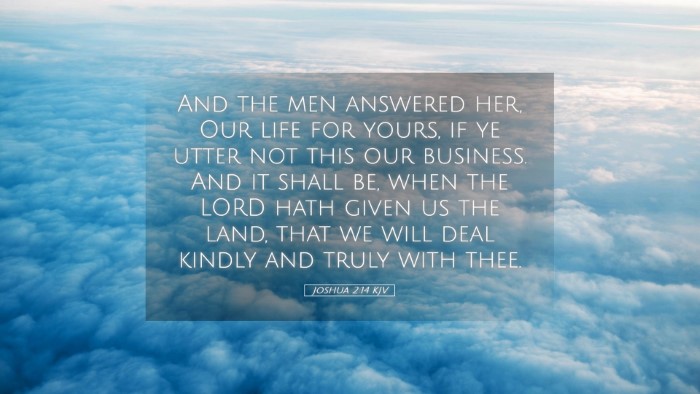Old Testament
Genesis Exodus Leviticus Numbers Deuteronomy Joshua Judges Ruth 1 Samuel 2 Samuel 1 Kings 2 Kings 1 Chronicles 2 Chronicles Ezra Nehemiah Esther Job Psalms Proverbs Ecclesiastes Song of Solomon Isaiah Jeremiah Lamentations Ezekiel Daniel Hosea Joel Amos Obadiah Jonah Micah Nahum Habakkuk Zephaniah Haggai Zechariah MalachiJoshua 2:14
Joshua 2:14 KJV
And the men answered her, Our life for yours, if ye utter not this our business. And it shall be, when the LORD hath given us the land, that we will deal kindly and truly with thee.
Joshua 2:14 Bible Commentary
Commentary on Joshua 2:14
Verse Citation: Joshua 2:14 - "And the men answered her, Our life for yours, if ye utter not this our business. And it shall be, when the LORD hath given us the land, that we will deal kindly and truly with thee."
Introduction
This verse serves as a pivotal moment in the narrative of Rahab's faith and the Israelites' encounter with her in Jericho. It reveals the principles of trust, covenant, and divine providence that are foundational to the narrative of Israel's conquest. Various public domain commentators provide in-depth analysis that connects these themes to broader theological understandings.
Contextual Background
The crossing of the Jordan River and the impending conquest of Canaan marked a significant transition for the Israelites. Joshua, as the leader of God’s chosen people, was tasked with executing the divine mandate to reclaim the land promised to their forefathers. The events leading to Jericho’s fall—and particularly this exchange with Rahab—demonstrate God’s providential guidance and mercy, even toward non-Israelites.
Insights from Matthew Henry
Importance of Rahab's Faith: Matthew Henry illuminates Rahab's exceptional faith and the implications of her actions. He notes, "It is a memorable instance of the faith of Rahab, that she, an ungodly woman, being convinced of God’s presence, acted with such daring bravery for the sake of His people." In her willingness to protect the spies, she exemplifies the idea of faith leading to deeds.
The Covenant of Protection: Henry highlights the profound agreement made between Rahab and the spies, interpreting it as a covenant based on mutual trust. He emphasizes, "Their promise to deal kindly with Rahab reflects God’s overall plan that extends beyond Israel, showcasing His mercy." Rahab becomes a symbol of inclusion, embodying hope for all who have faith.
Insights from Albert Barnes
Human Agency and Divine Will: Albert Barnes focuses on the dynamic relationship between human actions and divine sovereignty. He states, "The spies' commitment to Rahab signifies a reciprocal exchange of loyalty. Despite the peril they’re in, the spies are willing to commit to her safety." This interaction emphasizes God's providential care through human means, revealing that God often employs people to enact His purposes.
Rahab's Role in Salvation History: Barnes elaborates on how Rahab's faith leads to her significant standing within salvation history, highlighting that "her lineage eventually connects to Jesus Christ." This illustrates that God's redemptive plan encompasses all peoples, and it allows for the inclusion of those who exhibit faith, regardless of their background.
Insights from Adam Clarke
Rahab’s Faith Demonstrated: Adam Clarke offers a perspective on the audacity of Rahab’s faith, noting, "In perceiving the inevitable fall of Jericho, Rahab acted on conviction rather than mere speculation; her life hinged on the realization of God's promise to Israel." Clarke’s analysis echoes the broader theme of trusting God’s word amidst surrounding adversity.
The Conditional Nature of the Promise: He also notes the conditional aspect of the spies' promise, stating, "The spies assert that their life will be for hers, provided she keeps their mission secret. This duality reflects God's covenantal relationship, which often involves human responsibility alongside divine grace." This agreement underlines the importance of obedience to God’s commands and the resultant blessings that flow from it.
Theological Reflections
- The Inclusivity of God’s Redemption: The account of Rahab illustrates that God’s grace is not confined to Israel alone. It extends to those who demonstrate faith and obedience.
- Faith in Action: Rahab’s actions serve as a testament to genuine faith—believing is incomplete without corresponding actions that align with that belief.
- God’s Sovereignty in Salvation: The promises made to Rahab signify the unfolding of God’s redemptive plan and highlight His sovereign ability to use unlikely individuals to fulfill His purposes.
Practical Implications for Today’s Believers
In considering Joshua 2:14, contemporary pastors, students, and theologians can draw multiple lessons:
- Embrace Diversity: Faith communities should remain open to incorporating individuals from diverse backgrounds, reflecting God's inclusive love.
- Acting on Faith: Believers are encouraged to act decisively on their convictions, understanding that faith must manifest in tangible actions that serve God's Kingdom.
- Trusting God’s Plan: The assurance given to Rahab demonstrates the importance of trusting in God’s overarching plan, even when circumstances seem dire or confusing.
Conclusion
Joshua 2:14 encapsulates important themes of faith, covenant, and divine providence that resonate throughout the biblical narrative. Insights from Matthew Henry, Albert Barnes, and Adam Clarke converge to illuminate how Rahab's actions not only secured her safety but also positioned her within the lineage of Christ, illustrating the transformational power of faith. This analysis empowers modern believers to reflect on the essential nature of trust in God's promises while actively living out their faith in practical ways.


